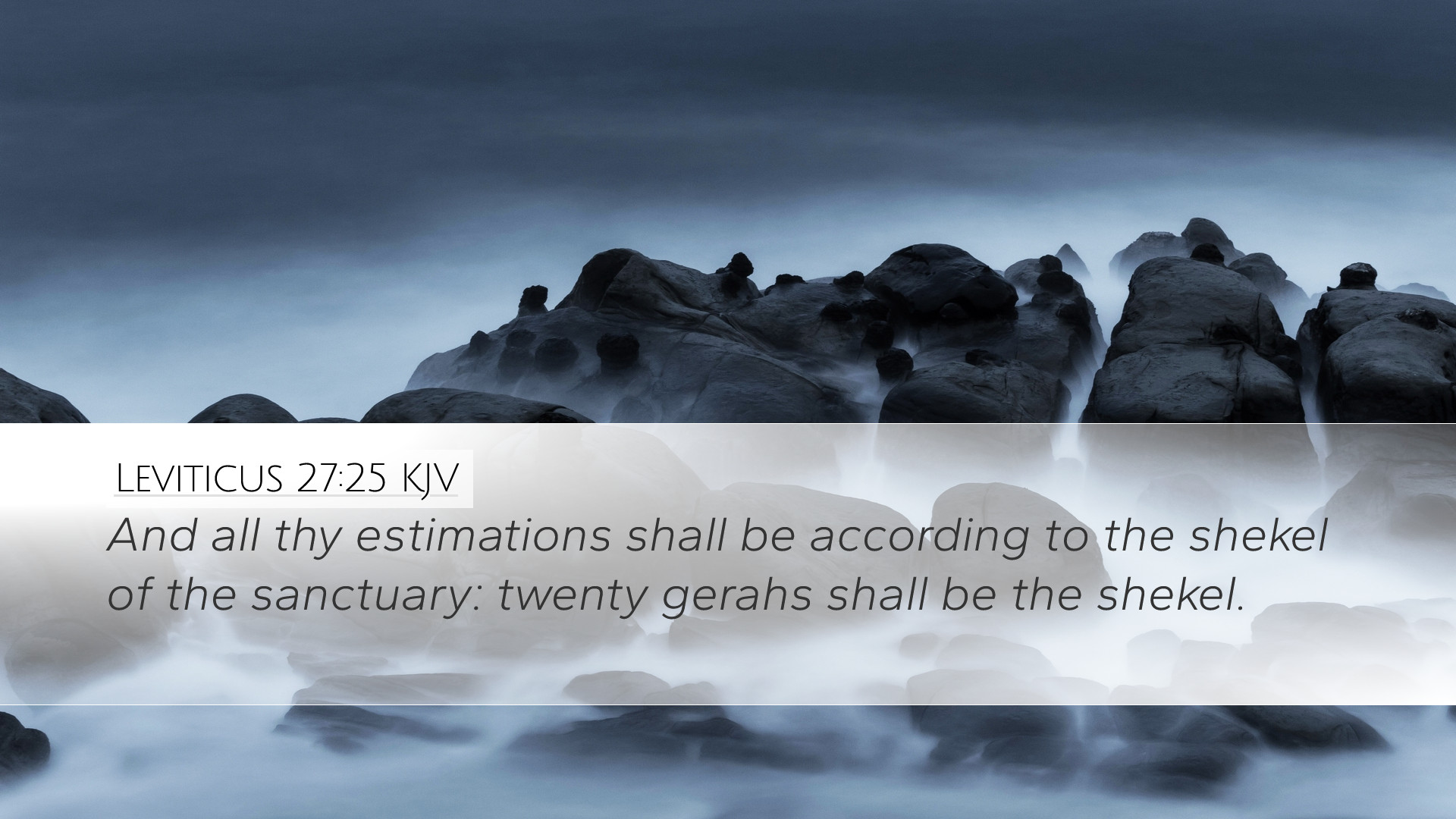Commentary on Leviticus 27:25
Verse: Leviticus 27:25 - "And if it be of an unclean beast, then he shall redeem it according to thine estimation, and shall add a fifth part of the money thereto."
Introduction
The book of Leviticus, standing as a significant pillar within the Torah, guides the Israelites in matters of holiness and regulation. Chapter 27, in particular, emphasis on the valuation of persons, animals, and property dedicated to God. Leviticus 27:25 encapsulates an important stipulation regarding valuations and redemptions, displaying the careful nature of Israelite law and its underlying principles of worth and sanctity.
Contextual Analysis
Before delving into the specifics of this verse, it is essential to recognize its placement within the broader context of Leviticus. The provisions laid out in this chapter focus on vows and dedicated things. The Israelites were instructed on how to redeem their offerings or property that might have lost its original, sacred status.
Understanding Unclean Beasts
In Israelite law, certain animals were classified as clean and unclean. Clean animals were permissible for consumption and sacrifice, while unclean animals were not. The distinction between the two is critical in understanding this verse. A similar value system is observed throughout various scripture passages (see Deuteronomy 14:3-21), where clean and unclean animals impact both ritual and community life.
Details of Redemption
The directive in Leviticus 27:25 highlights the provision for redemption based on a fair valuation. In a scenario where an unclean beast was dedicated to God, the owner had the opportunity to redeem it following the set valuation guidelines. This process signifies the overarching principle of justice in financial matters and the intrinsic value accorded to animals, even if deemed unclean.
The Fifth Part Addition
A compelling aspect of the verse is the requirement to add a fifth part to the redeemed animal's value. This principle indicates that redemption is never considered a mere transaction but an act of serious reflection and commitment to God’s laws. The added amount functions as both a fine and a testament to the worthiness of dedicating something to God, according to Henry's commentary.
Theological Implications
Matthew Henry elucidates that this text expresses a broader truth about divine ownership. All creatures belong to God, and while some may be termed unclean, they still bear intrinsic value given their creation. The act of redeeming one’s possession—even an unclean beast—demonstrates a desire to maintain a relationship with God while adhering to righteousness.
The Principle of Valuation
Albert Barnes emphasizes that the valuations presented in Leviticus reflect the equity acknowledged within God’s law. It drives home the idea that God’s people must approach Him on His terms, acknowledging that faithfulness is often tied to the material offerings made, even when those offerings may seem less significant by human standards.
Balancing Cleanness and Uncleanliness
In this context, Adam Clarke argues that the distinction between clean and unclean beasts serves a dual purpose: both ritualistic and relational. While unclean animals cannot be offered for sacrifice, the redemption process signifies that nothing in life falls outside God's dominion and authority.
Pastoral Insights
For pastors, this verse has significant implications for teaching congregations about the nature of sacred vows and offerings. The idea of redemption entails that believers may possess things once considered unclean—be they moral, spiritual, or material—and still seek God’s favor in overcoming those challenges. Redemption emphasizes hope, reminding us that the means available through faith are for all, regardless of past failings.
Practical Applications for Believers
- Embrace of Redemption: Understanding the redemptive mechanism is vital for believers; it illustrates that no one is beyond repair. The call to redeem unclean animals serves as a metaphor for personal redemption in Christ.
- Reflect on Value: Believers should frequently evaluate what they offer to God. Are we giving less than our full potential or offering things of lesser value? The fifth part added encourages additional consideration of the worth of our offerings.
- Encourage Ethical Stewardship: In a world where transactions and materialism abound, adhering to the principles of valuation and ethical redemption helps reinforce that God's kingdom operates on a different standard—one that prioritizes holiness and integrity.
Conclusion
Leviticus 27:25 serves as a poignant reminder of the interplay between divine command, value, and human responsibility. It challenges believers to approach God with heart-felt intentions and honest evaluations, showing that while unclean beasts symbolize imperfection, they too hold potential for redemption within the hands of God. As we reflect on these insights, may we remember that God desires our best, redeemed from our past, and dedicated to His purposes.


